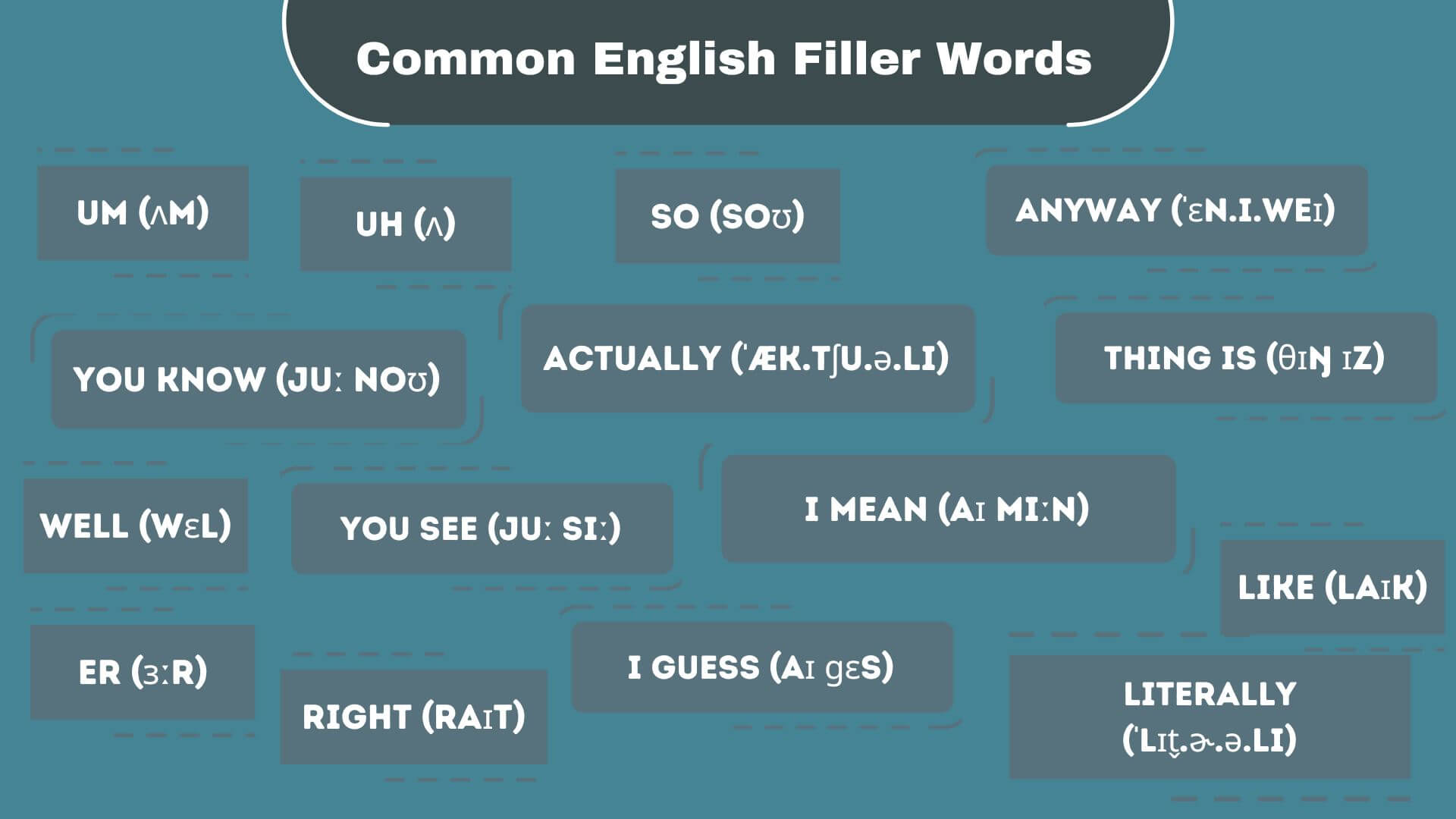In the world of clear communication, simple filler words like ‘um,’ ‘uh,’ and ‘you know’ help us connect ideas and avoid awkward pauses. Though often seen as bad habits, these small words can actually keep listeners engaged and give speakers a moment to think. But, it’s all about balance. Too many can clutter our speech, and too few can leave gaps. So, how do we get it just right? How can we use these fillers wisely to keep our words flowing smoothly without losing our message?
Understanding Filler Words in English
In linguistics, verbal fillers are words that don’t mean much but help people keep talking without awkward breaks. They give people a moment to think. You often hear ‘um,’ ‘uh,’ and ‘er’ when someone is trying to avoid silence or needs time to think.
Words like ‘you know,’ ‘like,’ and ‘I mean’ also pop up a lot. They help clarify or stress what someone is saying. Even though these words might not look important, they really help keep our conversations flowing smoothly.
Common English Filler Words and Their Examples

Um (ʌm)
Usage: A common sound used when the speaker is pausing to think or is unsure what to say next.
Example: “Um, I’m not really sure what to say.”
Uh (ʌ)
Usage: Similar to “um,” it is used to fill a pause while the speaker thinks.
Example: “Uh, can you repeat the question?”
Like (laɪk)
Usage: Frequently used as a filler in casual speech to emphasize or describe something with hesitation.
Example: “It was, like, the best concert I’ve ever been to.”
You know (juː noʊ)
Usage: Used to check if the listener understands or to fill pauses.
Example: “It’s, you know, really important to stay hydrated.”
Actually (ˈæk.tʃu.ə.li)
Usage: Used to emphasize or clarify something, often to express a contrast or surprising fact.
Example: “I actually prefer coffee over tea.”
Basically (ˈbeɪ.sɪ.kli)
Usage: Used to simplify or summarize a point.
Example: “Basically, we need to finish this project by Friday.”
I mean (aɪ miːn)
Usage: Used to clarify or emphasize what was just said.
Example: “I mean, it was a tough decision to make.”
So (soʊ)
Usage: Commonly used to start a sentence or segue into a new thought or conclusion.
Example: “So, what do you think about the new policy?”
Well (wɛl)
Usage: Used to soften the introduction of a statement, often when the speaker is unsure or hesitant.
Example: “Well, I guess we should get started then.”
Right (raɪt)
Usage: A conversational filler used to confirm understanding or agreement.
Example: “That makes sense, right?”
Er (ɜːr)
Usage: Similar to “um” or “uh,” used to express hesitation or uncertainty.
Example: “Er, I’m not sure if that’s the right answer.”
Sort of (sɔːrt əv)
Usage: Used when the speaker is unsure or trying to express something vaguely.
Example: “It’s sort of complicated, but I’ll try to explain.”
Kind of (kaɪnd əv)
Usage: Similar to “sort of,” this phrase softens the statement and shows some level of uncertainty.
Example: “I’m kind of busy right now, but I’ll call you later.”
You see (juː siː)
Usage: Used to explain something or emphasize a point to the listener.
Example: “You see, the problem is that we don’t have enough time.”
I guess (aɪ ɡɛs)
Usage: This phrase conveys uncertainty or a lack of strong conviction.
Example: “I guess we could try a different approach.”
Or something (ɔːr ˈsʌm.θɪŋ)
Usage: A vague phrase often used to offer an alternative or when unsure of details.
Example: “We could go to the park or something.”
You know what I mean (juː noʊ wʌt aɪ miːn)
Usage: This phrase is used to emphasize relatability or check for understanding.
Example: “It’s been a tough week, you know what I mean?”
Anyway (ˈɛn.i.weɪ)
Usage: Used to redirect or bring the conversation back to the main point.
Example: “Anyway, let’s get back to the main topic.”
Like I said (laɪk aɪ sɛd)
Usage: Used to refer back to a previously stated point, usually for emphasis.
Example: “Like I said, we’ll need more time to finish.”
At the end of the day (æt ði ɛnd ʌv ðə deɪ)
Usage: A phrase often used to sum up a point or emphasize the most important factor.
Example: “At the end of the day, it’s all about teamwork.”
Literally (ˈlɪt̬.ɚ.ə.li)
Usage: Used for emphasis, though sometimes not meant to be taken literally.
Example: “I was literally shaking when I heard the news.”
To be honest (tə bi ˈɒnɪst)
Usage: This phrase is used to introduce a more candid or straightforward opinion.
Example: “To be honest, I don’t really enjoy working on weekends.”
If that makes sense (ɪf ðæt meɪks sɛns)
Usage: Used to check whether the listener understands or agrees with what was said.
Example: “We should wait for the data before deciding if that makes sense.”
I don’t know (aɪ doʊnt noʊ)
Usage: A phrase used when the speaker is unsure or hesitant about what they’re saying.
Example: “I don’t know, maybe we should ask someone else.”
Thing is (θɪŋ ɪz)
Usage: Used to introduce or clarify an important point in the conversation.
Example: “The thing is, we haven’t received enough feedback yet.”
The Impact of Filler Words on Communication
Positive Effects
Using filler words like ‘um’ or ‘you know’ can actually help in conversations. When used right, they give you a little break to think and can make what you’re saying clearer. This is really handy in casual chats or when the topic is tough. It keeps people listening without getting lost. Also, if English isn’t your first language, these fillers can fill in gaps while you find the right words. This makes it easier to keep up in discussions.
Negative Effects
When you use too many, it interrupts the flow. This makes you seem unprepared or not confident. These extra words cloud what you’re trying to say, making it hard for others to get your main points. In work environments, if you lean on these fillers, it can make you look less credible or like you don’t fully understand your topic. It can also wear out your listeners, making them tune out. While a few fillers can help speech flow better, using them too much really gets in the way of speaking clearly and effectively.
Also Read: Weird Words In English: 80+ Must-Know Terms For Vocabulary Enthusiasts
Strategies to Minimize the Use of Filler Words
Increasing Self-Awareness
Boosting self-awareness is key to cutting down on filler words when you talk. A good tactic is to listen to how you speak during conversations. Try recording yourself and listen to it later to spot any repetitive filler words.
Also, right after you talk, whether in a meeting or a chat, think about how you did. What could be better? Getting feedback from friends or mentors who will be honest with you is super helpful too. They can point out when you’re slipping in those extra fillers without realizing it.
This kind of feedback helps a lot. It makes you more aware and pushes you to tweak your way of speaking bit by bit. This way, you’ll start dropping those unnecessary words and make your communication clearer and more direct.
Slowing Down Speech
Slowing down how you talk really helps cut down on those extra words we sometimes throw in, like ‘um’ or ‘like.’ When you slow down, you give yourself more time to think about what you want to say. This makes your speech clearer and keeps people listening.
Plus, it helps you organize your thoughts better before you say them out loud. Using pauses is smart too. They let you catch your breath and think for a second instead of using unnecessary words. This way, you sound more sure of yourself and your ideas.
Practicing Public Speaking
When you practice public speaking, it helps you slow down and cut down on filler words. If you speak regularly, like in debates or presentations, you start to speak more clearly and to the point. As you keep speaking, you become better at managing pauses without relying on fillers. Getting feedback from the audience or mentors points out where you use too many fillers, so you can work on those areas.
Simple techniques, like rehearsing your speech or focusing on your breathing, help a lot. This makes your communication skills better and boosts your confidence.
Conclusion
In conclusion, using English filler words wisely can make conversations flow better by filling pauses and giving time to think. But, relying too much on them can damage your credibility and make your message unclear.
It’s important to find a good balance, using filler words only when needed and being comfortable with silence sometimes. By being more aware of how you speak and practicing deliberate communication, you can use both filler words and silence to make your conversations more effective. Keep visiting the Translation Blog for more informative articles like this.

